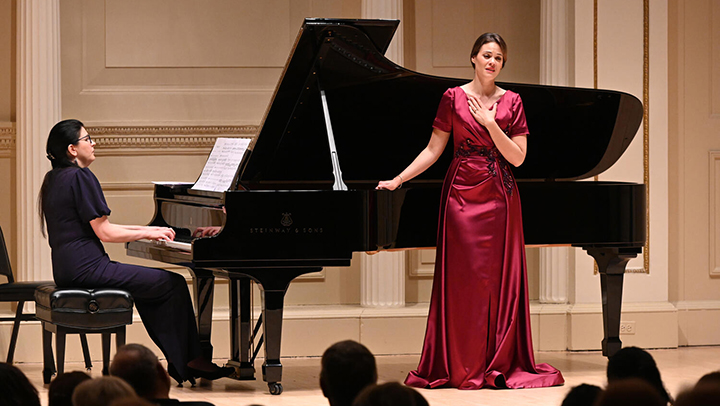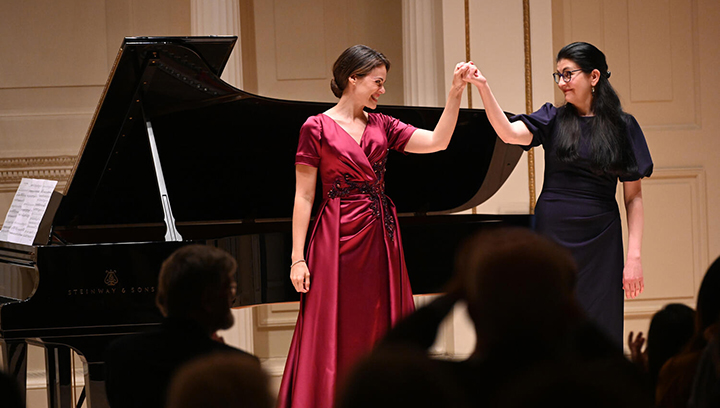She came exquisitely prepared—not a music stand in sight—and offered an ambitious, varied program that juxtaposed German lieder in the first half with folk-infused English language songs in the second. Yet it wasn’t until her first encore that Mühlemann fully demonstrated the sweet spot of her artistic potential.
With a bright, crystalline tone and admirably unaccented English diction, Mühlemann delivered a charming rendition of “I Cannot Tell What This Love May Be,” from Gilbert and Sullivan’s Patience. Her delivery was funny and charming, with a fair amount of wryness underpinning the straightforward lyrics, and the brief coloratura runs that close the aria were cleanly executed. Mühlemann followed with a traditional song from her homeland, “Plange,” which she previously recorded on her album Lieder der Heimat (Songs from Home). After joking that it was perhaps the first time Swiss-German had been sung at Carnegie Hall, she offered a plaintive and deeply felt rendition of this simple, affecting air.
Mühlemann’s light-tone voice, pretty but not terribly distinctive, seems ideally suited to these areas of music. Given that her voice truly sparkles in its highest range, you could easily imagine her having great success as a second lead in operettas, making the most of lovestruck comic humor. Her clear affection and affinity for the music of her home culture also shone through. Having dipped into several of her albums prior to the performance, the disc of Alpine music easily eclipsed more virtuosic offerings that pushed her to her interpretive limits.
-yFYPpPC1VrjWNDw&index=15Those limits were also evident throughout the rest of the concert, which was intermittently enjoyable but not without its disappointments. In Schubert’s “Viola” (D786), which opened the evening, Mühlemann maintained a compelling narrative arc throughout the long poem but struggled with intonation as the voice moved between registers. Her basic sound also diminished in color at the lower end. The soprano’s regular accompanist, Tatiana Korsunskaya, could also have made more of the many repeated notes throughout the song, which instead sounded plodding and mechanical here. It reminded this listener how spoiled we’ve become to expect the likes of Uchida, Kissin and Trifonov as regular recital partners in these environs.
Songs about flowers dominated the first half, with Richard Strauss’s Mädchenblumen providing a solid showcase for the most congenial qualities of Mühlemann’s voice. Still, other singers have made more of the beguiling poetry found in Felix Dahn’s texts; the sad subtext of “Efeu,” about the inextricable bond of love and death, didn’t entirely come through. “St?ndchen” capped this section, its dexterous demands particularly challenging for Mühlemann, whose high notes here tended to harden rather than bloom.
The galloping pace of “Spring,” which opens Dominick Argento’s Six Elizabethan Songs, also taxed, and the various onomatopoeic aspects of the text took on a campy vibe. The bright and jumpy quality of “Winter,” the first of two Shakespeare settings in the cycle, suited Mühlemann better, contrasting nicely with the contemplative mood of “Dirge,” which followed. Korsunskaya brought more poetry to the spare accompaniment here than in the more outwardly ebullient music heard elsewhere. Ben Jonson’s “Hymn,” which closed the set, was also thoughtfully performed, although the vocal leaps didn’t always land squarely on pitch.
The six songs by Frank Bridge that ended the printed program were a pleasure to hear. Those who know “Love Went A-Riding” primarily as a famous Flagstad encore, where it sounds almost like a Wagnerian parody, will not be surprised to know that Mühlemann takes it in a different direction—one of charm and youthfulness. Similarly, “Golden Hair” (after James Joyce) lacked the slightly voyeuristic subtext you sometimes get when performed by a man, instead becoming sweet and melodic.
Despite a generous intermission, the entire concert (including encores) barely came in at ninety minutes, and it was unclear whether you left wanting more or less. Mühlemann clearly possesses many talents, but a decade into her mature career, she came across here as an artist not quite fully formed. Hopefully her ambition and acumen will continue to coalesce.
Photos: Pete Checchia




